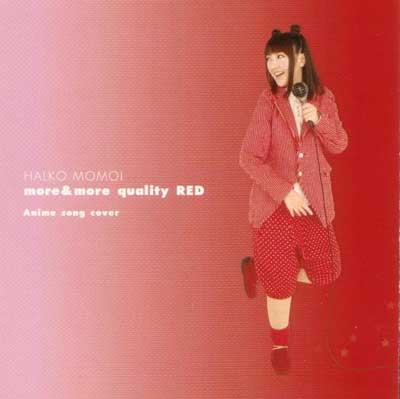Hai Fidelity
Halko Momoi: More&more Quality
by Rachael Carothers,

 |
Click below for a clip of the song "Gamble Rumble " |
Get the Flash Player to see this player. |
Halko Momoi is not only a voice actress but a singer as well. She has performed theme songs for various anime series and video games both on her own and as the lead singer for the duo UNDER17. On December 3, 2008, she released a pair of cover albums. More&more Quality White has her singing songs that she had written but not necessarily performed previously, while more&more Quality Red consists of anime theme songs originally performed by other artists. Will Momoi be able to handle songs from artists such as Mari Iijima and T.M. Revolution?
Megumi Hayashibara is widely regarded as a talented singer and seiyuu. “Give a REASON',” the opening theme for Slayers Next, is one of her many songs. Momoi's version would be a spot-on recreation of the original if it wasn't for Momoi's higher-pitched, almost-childish voice. While this does change the song slightly “REASON'” is still a wonderfully enjoyable tune.
The opening theme for Initial D: Third Stage, “Gamble Rumble” by m.o.v.e., speeds into second place. Once again, Momoi's vocals are higher-pitched compared to Yuri's, though motsu's rap is still used. The contrast of the squeaky singing with the deeper rap is a bit weird but, as a whole, it's not terrible. While this version of the song is fairly decent, the higher vocals make it sound a little more like a pop song instead of an awesome dance tune.
“Butter-fly,” the theme song for the first season of Digimon Adventure, is up next. Originally performed by Kōji Wada, there was a bit of an adventurous feel to the original version of the song. Somehow, in the translation to a childish female voice, that feeling has been completely lost. Unfortunately, this version is simply annoying and difficult to listen to.
As if the previous song wasn't bad enough, a torturous version of “Happy Material” from Negima! appears. Despite being performed by the show's characters, the original song sounded like a normal song. The voices weren't the extremely childish-sounding anime schoolgirls. This is what Momoi has done to the song. She has taken her voice to a brand new pitch in an attempt to make it sound ‘schoolgirlish.’ All it did was make the song unbearably awful.
Halfway through the album, we are given the English version of “Soldier Dream” from Saint Seiya. Thankfully, Momoi has taken her voice back to her original range. This version isn't quite as strong as the original by Hironobu Kageyama, but the flowing vocals make it a cute song. Where the original sounds like it should go with a masculine fighting show, Momoi's version sounds like it would be better paired with something like Sailor Moon.
Racing in from the early 1990's, a song from Dash! Yonkurō, “Dash! ~Racer Mini Yonku no Theme~” (“Dash! ~Mini Racer Yonku's Theme~”), is in the sixth spot on the album. Sadly, I was not able to find the original version of the song for comparison. On the bright side, both the opening and ending themes for the anime sound like terrible 1970s songs. Luckily, this version is catchy and Momoi's voice actually matches it very well. It's a good bet that this will be the best song on the album.
Minmay's beautiful “Ai Oboeteimasuka” (“Do You Remember Love?”) from The Super Dimension Fortress Macross: Do You Remember Love? movie slides in gracefully. Considering Mari Iijima and Momoi have very similar voice types, it's not surprising that the new version of the song sounds almost identical to the original. Granted, there are a few high notes that were slightly too high but they can be forgiven. Even if you hate the movie, you can't possibly hate the song.
The eighth track is “Invoke,” the Mobile Suit Gundam Seed opening theme song by T.M. Revolution. In the new version, Momoi tries to keep her voice in the lower register. Amazingly, it works well for her. Nishikawa's voice isn't particularly deep in the original so Momoi using her ‘deep’ voice is a nice compliment to the song. This sound is much, much more preferable to the atrocious voice she used in “Happy Material.”
Nearing the end of the album, we're taken back to the ‘80s with “STEP,” the opening theme for Mashin Eiyūden Wataru. I am smack dab in the middle of the fence with this one. The original version had a cuteness factor to it that the new version annihilates. Someone decided that this needed to be a dance song and filled every piece of it with filters. On one hand, after listening to the original, this one sounds awful. On the other hand, if you've never listened to the original and have no intention of listening to it, this isn't an entirely terrible dance tune. Despite filtering the life out of the song, there are little bits that make it somewhat enjoyable. Though I think the original is the better of the two.
“Romance no Kamisama” (“God of Romance”) by Kohmi Hirose finishes off the album. While this is an anime cover album, there doesn't seem to be any relationship between this song and anime. (Unless you count being featured in a version of Dance Dance Revolution, which I don't.) For the first time, I think that Momoi's ‘anime voice’ version may be better than the original. Hirose's 1993 version is a rather typical pop song from that era and, as such, hasn't aged well. While I would love to rip Momoi's ‘anime voice’ out of her throat, it does fit this song, giving it an entirely new level of cuteness. I don't want to like this song but it is impossible not to find it absolutely adorable.
Listening to this album, it's obvious that Momoi has talent. Unfortunately, it doesn't shine here. A lot of the early songs are ruined by her high-pitched voice, which seems to disappear for most of the second half of the album. When she does manage to kick her voice into a lower range, which would actually be a middle range for the rest of the singing world, she sounds very good. I would be interested to hear some of her other songs to see which she prefers in her own music – the high annoying voice or the deeper beautiful voice.
discuss this in the forum (16 posts) |
this article has been modified since it was originally posted; see change history